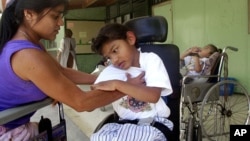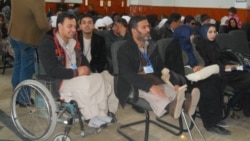“Around the world, many children are forced to find work because schools are not accessible or accommodating,” says Thomas Richards, the chief of staff of the U.S. Department of Labor’s Bureau of International Labor Affairs.
“Issues of poor transportation, lack of awareness, and inaccessible buildings” he notes, “often take capable kids out of the school house and put them into the workforce.”
Yet, the barriers are not only in schools, but also in the labor market. Discrimination and bias, along with poor accessibility to transportation and buildings, often keep persons with disabilities from finding and keeping good jobs.
“Without access to an education and the opportunity for decent work,” Mr. Richards warns, “these vulnerable workers are therefore more likely to be subject to exploitation and forced labor.
The United States is a global leader in promoting the rights of individuals with disabilities and the department’s Bureau of International Labor Affairs – ILAB for short – seeks to end workplace exploitation of all vulnerable populations, including persons with disabilities. ILAB draws on the expertise of the department’s Office of Disability Employment Policy – or ODEP – and key U.S. government leaders to advocate for policies and programs that support solutions to the challenges facing the international disability community.
Recently, ILAB partnered with ODEP and the State Department’s Special Advisor for International Disability Rights Judith Heumann in promoting disability and labor rights internationally. The partnership successfully advocated for the labor and employment rights of persons with disabilities and the mainstreaming of disability in key policies and programs adopted at the 2014 meeting of labor and human resource ministers representing the 21-member economies of the Asia-Pacific Economic Cooperation, a key regional multilateral organization.
In addition to promoting policies in international organizations, ILAB awards grants which provide informal and alternative education services to children engaged in or vulnerable to child labor. These programs are tailored to address the specific educational needs of child laborers, many of whom have disabilities.
“Promoting the rights and protections of persons with disabilities around the world is a priority for the Department [of Labor] and ILAB,” Mr. Richards says, “and there is much more work to be done.”






